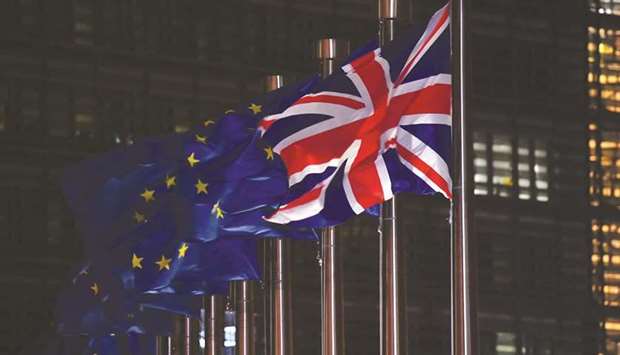The UK government has demanded that the EU re-negotiate post-Brexit trading arrangements for Northern Ireland after rioting and business disruption hit the restive province.
The European Union has long insisted that it is up to London to implement what it agreed in their drawn-out Brexit divorce, and the US administration is also looking on warily at the UK manoeuvres.
London stopped short of suspending the so-called Northern Ireland Protocol, which requires checks on goods crossing over from mainland Britain.
However, Northern Ireland Secretary Brandon Lewis told parliament that while the UK had negotiated the protocol “in good faith”, its real-world application by the EU had entailed “considerable and continuing burdens”.
“Put simply, we cannot go on as we are,” he said.
Rather than ad-hoc grace periods for border checks, Lewis said that the UK is seeking a “standstill period” for the protocol including legal action by the EU.
He pressed for a new dialogue “that deals with the problems in the round”.
“We urge the EU to look at it with fresh eyes and work with us to seize this opportunity and put our relations on a better footing,” Lewis added.
The protocol was painstakingly negotiated to avoid a hard border with Ireland, by effectively keeping Northern Ireland in the EU’s single market.
Northern Ireland, which suffered three decades of sectarian conflict until a peace agreement in 1998, has been rocked by violence this year, in part against the protocol.
Many pro-UK unionists see it as creating a de facto border in the Irish Sea with mainland Britain and say they feel betrayed.
In its proposals, Britain urged the EU to stop broad checks and focus more squarely on goods “genuinely” at risk of entering its single market via Northern Ireland.
The government insisted that for all other goods, a light touch was needed to preserve Northern Ireland’s integral status as part of the UK.
It also wants the removal of any oversight role by the European Court of Justice.
Frustrated at the new red tape since the UK left the EU fully at the start of this year, several UK companies have already suspended sales to Northern Ireland, or are offering a reduced choice.
Retail chain Marks and Spencer said that in the protocol’s current guise, there will be “gaps on the shelves” in Northern Ireland this Christmas.
In a telephone call on Tuesday, Prime Minister Boris Johnson told Irish counterpart Micheal Martin the protocol was “causing significant disruption” and changes were essential, according to Downing Street.
But the EU, seeking to preserve the integrity of its single market, says Britain has been acting in bad faith, knowing full well what it signed up to.
There was no immediate comment from Brussels, but European Commission President Ursula von der Leyen last week denied the EU was being dogmatic in its application of the protocol.
Ireland’s European affairs minister, Thomas Byrne, said that Dublin would “listen carefully to what the British government have to say”, but insisted that any remedies must respect the hard-fought pact.
“We’re willing to discuss any creative solutions within the confines of the protocol,” he told BBC radio. “But we have to recognise as well that Britain decided itself to leave the single market of the European Union, to apply trade rules, to apply red tape to its goods that are leaving Britain, to goods that are coming into Britain.”
“We cannot go on as we are,” Brexit minister David Frost told parliament yesterday.
He said London wanted a new “balance” to eliminate EU oversight of the accord, and that Britain already had the right to unilaterally deviate from parts of it.
European Commission Vice President Maros Sefcovic was clear that the protocol could not be redrawn, saying that Johnson and Frost had negotiated it.
“We will not agree to a renegotiation of the protocol,” he said. “Respecting international legal obligations is of paramount importance.”
“We will continue to engage with the UK, also on the suggestions made today,” Sefcovic said in a statement. “We are ready to continue to seek creative solutions, within the framework of the protocol, in the interest of all communities in Northern Ireland.”
Much of what Britain has suggested as an alternative system was rejected by the EU during the four years of often tortuous talks.
Irish Foreign Minister Simon Coveney said any solution must remain within the terms of the agreed protocol.
Frost said Britain wanted a “normal treaty framework” that was “more conducive to the sense of genuine and equitable partnership”, and would not be policed by EU institutions and the European Court of Justice.
“We don’t see what is wrong with that. Anyone would think that it was a highly unusual thing to renegotiate a treaty; of course it is not,” he told lawmakers.

A UK national flag flies beside EU flags outside the Berlaymont building in Brussels. Accounts publi


